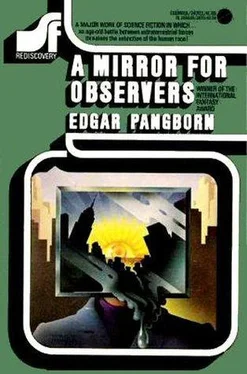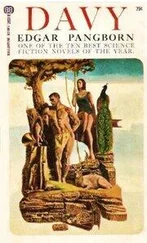I followed a street uphill. Separate houses with lawns, somber men being walked by small dogs. At the crest one looked down at city lights fantastically calm. My night vision, better than human, allowed me to see beyond them to distant fields and woods, delicately secret even in daylight with lovable small life in the grass and bushes. The moon was rising. I strolled in that placid region, admiring some of the houses, reflecting that the owners used the same type of aspirin as their neighbors downtown. I returned to the business district by another route, wondering if it could be true that someone was following me.
A sly footstep never quite heard, a shadow never quite seen against hedge or doorway. Oh, I had been fretting more than I realized, about Namir. That was all, I thought — that and fatigue.
The movie theaters were closed. The crowd had thinned and changed: fewer of the cheerful, more of the predatory. I bought a late newspaper and shoved it in my pocket after a glance at the headlines. The present seems to be an interlude of relative calm, but now human beings are too shrewd to suppose that the volcanoes under the surface are dead. They were fooled that way, I recall, in the ’880s and ’890s. They have learned a few things since then. The United States of Europe is functioning rather well if creakily, though everyone is afraid of the logical next step of Atlantic Federation, and the One World Government boys and girls are clouding the issue as usual with well-meant enthusiasm. There are three Iron Curtains now: Russia’s, China’s, and the curious new one, growing higher each year ever since the death of Stalin, between Russia and China themselves. But the seven or eight major civilizations of the world are cohering; except for those two eclipsed by ancient despotism, the civilizations may be feeling their way to an enduring compromise. One doesn’t look for the small promises of an ethical revolution in the headlines: the ocean’s currents do not derive from the ocean’s tempests…. Eisenhower’s successor appears to be a reasonable man: I gather that few seriously dislike him, though it’s hard to fill such a pair of shoes. The trend is likely to be against him in ’964, with the customary jump a little too far left. That doesn’t worry me.
Back on the wrong side of the tracks, I entered a park up a side street near Calumet. It was mere leftover space created by an angling cross street. Brick walks too bumpy for roller skates, patches of stubborn grass. Two old men were playing checkers under a park lamp. I rested on a bench in the moon-shadow of a maple, wondering if this might be the park where Observer Kajna had overheard a certain conversation.
A hundred yards away were two clusters of benches, deserted except for a gaunt fellow, head bowed in his hands. Drunk, sick, or derelict, I thought. Two soldiers and their girls sat down near him and he got up and lurched away, on a path that would bring him past me. He did not pass me, and I looked again. He was stumbling off in the other direction, crossing grass as if to avoid the checker players’ lamp.
My bench was deeply shadowed. He could hardly have made me out with drunken human eyes. I caught no Martian scent, but the breeze was wrong. My own scent-destroyer was fresh, but I had made no change in my face since Namir saw me in Northern City.
Dismissing uneasiness, returning to the now indolent night life of Main Street, I entered a bar (not my first that evening) and listened to the long gush of words, variations on the silly, wise, obscene. That was restful. It spoke well for my manner and appearance that nobody gave the skinny rye drinker a second glance until I invited it, rambling into an argument with a plumber over the future of the world’s fuel supply. It has become fashionable to fret about that. We bought three rounds. I said solar energy, wind, water power, and alcohol, but in the end I let him have his atoms, what the hell.
“Thing is,” he said, “you got to hitch to a star. When I think of the things my kids’ll see! You figure there’s life on Mars?”
“No atmosphere,” said a fat man the plumber called Joe.
“Now it stands to reason,” said the plumber, and pounded a puddle on the bar and apologized for splashing me. “They see green in the telescopes, don’t they? How about that?”
“Lichens,” said Joe. “Meant to say not enough atmosphere, see?”
“You can take your lichens,” said the plumber, “and — well, it stands to reason, and anyway why couldn’t they live underground, seal in the atmosphere, what the hell?”
“Not me,” said Joe. “I’d get this now clusterphobia.”
“All the same you can take your lichens—”
I was back at the lodging house before midnight, happy about moonlight on square quiet houses, happy about someone plinking a mandolin late and gently behind drawn curtains, happy about our Salvayan capacity for alcohol. My plumber had gone home under convoy of Joe and another, the three of them operating rather like a minesweeper with a one-eyed pilot.
There was a night light in the hall, and more light from the open door of the first-floor front. That would be Mr. Feuermann, I remembered, and I saw him, a white-haired old gentleman in an armchair, his feet up on a stool. He was cherishing a horse-head meerschaum. Purposely I tripped. He cleared his throat and came stumping out. “All right?”
“Yes, thanks — turned my ankle a bit.”
We examined each other with the furtive measuring of human strangers. He was obviously lonely. “Too bad,” he said, and studied the carpet with some hostility, plainly worried about trouble for Mrs. Pontevecchio. “It looks all right.”
“It wasn’t the carpet. Fact is I had one too many.”
“Oh.” A solid old man, though tall and not stout. “Sometimes,” he said, “if you make the hair on a long-haired dog a mite longer…?”
So I went into his room and he broke out a pint of bourbon and we discussed it for an hour. He claimed he’d left the door open to clear away stale smoke, but then admitted he was always hoping someone would drop in. He had been a railroad engineer until twelve years ago, when he retired, because of age, because Diesels were hooting the end of steam and he was too old for new techniques. He had been a widower for six years; his only child, a daughter, was married and living in Colorado. Once his work had taken him all over the States. He spoke warmly and poetically of that wandering on steel pathways, but Latimer was home and he would not leave it again.
I did not try to steer the talk to the landlady’s son: the old man did so himself. Jacob Feuermann had lived in that house since his wife died. I understood, without words, that the Pontevecchios had become an adopted family for him. Their troubles were his, and perhaps he knew that there was on him a reflected glow of Angelo’s strangeness.
He remembered Angelo as a huge-eyed six-year-old, not talkative but intensely observant, given to fierce fits of temper — caused, Feuermann believed, by frustrations that would not have badly troubled ordinary children. In retrospect, Feuermann took a sort of proprietary pride in those tantrums. Angelo had never been a naughty child, he said. Angelo took punishments with good grace and rarely repeated an offense; but a toy out of reach, a tumbling block house, a missing jigsaw fragment could turn him blue in the face. “Even now, when he’s got over that, you couldn’t call him a happy kid, and I don’t think,” Feuermann said, “the bad leg has much to do with it….” When Feuermann first came to the house, Rosa had been bearing a private crucifixion of despair over those temper fits, her mind approaching and skittering away from the word “insanity” (that fog-word, Drozma, still terrorizes any human being who has learned no discipline of definition). She had confided much in Feuermann. He also remembered her husband in the flesh.
Читать дальше












